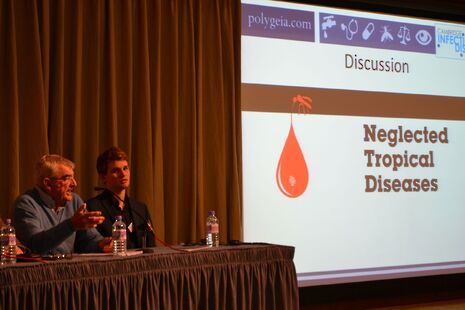Polygeia: students shaping global health policy
Sara Devereux reports on Polygeia’s inaugural global health conference

It’s hard to imagine that a group of students could actually make a difference in combating global health problems – but those at last weekend’s Polygeia conference have certainly taken a step in the right direction.
Following its creation in January, Polygeia has attracted students across the university to contribute to Cambridge’s first global health think-tank. They have identified problems in global health, focusing on five main areas: antimicrobial drugs, health partnerships, mental health, neglected tropical diseases and sexual and reproductive health. Over the course of 10 months, and with guidance from established academic advisors, they have researched and developed their own ideas on policies that they believe will help to tackle these problems.
On Saturday 15 November Polygeia held their inaugural global health conference in St John’s College. They presented a number of policy proposals, before opening up to questions from both the audience and global health professionals. Dr Lorenzo Savioli, ex-director of the World Health Organization’s Department of Control of Neglected Tropical Diseases, commented on the high standard of the presented papers, and suggested that the students should open their policy papers up for peer review and publish them.
Midway through the conference, a few audience volunteers were brought out of the room and challenged to come up with an idea that would utilise both the audience and their technology to help tackle the problem of the lack of funding directed towards neglected tropical diseases. With 1.5 billion people in the world suffering from a group of 17 neglected tropical diseases, this seemed a worthwhile endeavor. Their proposal: an online campaign targeting the most prevalent neglected tropical disease, intestinal worms (also known as soil-transmitted helminths). The campaign would be similar to the ‘ALS ice-bucket challenge’, but instead of throwing a bucket of ice on themselves, participants would attempt to do ‘the worm’ (a dance move), promoting it online with ‘#wormvsworms’ and nominating three other people to take on the challenge and/or donate. For more information on the campaign, visit Polygeia’s Facebook or Twitter.
Polygeia hope to expand into other universities, having already implemented links with Oxford, Imperial and UCL. Anastasia, a committee member, commented that "it is a case of structuring how we develop, rather than if".
In January, Polygeia are opening their doors to potential commissions for the next round of policy papers. More information about how to get involved is available on their website.
 Interviews / ‘People just walk away’: the sense of exclusion felt by foundation year students19 April 2024
Interviews / ‘People just walk away’: the sense of exclusion felt by foundation year students19 April 2024 News / Copycat don caught again19 April 2024
News / Copycat don caught again19 April 2024 News / John’s spent over 17 times more on chapel choir than axed St John’s Voices22 April 2024
News / John’s spent over 17 times more on chapel choir than axed St John’s Voices22 April 2024 News / Climate activists smash windows of Cambridge Energy Institute22 April 2024
News / Climate activists smash windows of Cambridge Energy Institute22 April 2024 Theatre / The closest Cambridge comes to a Drama degree 19 April 2024
Theatre / The closest Cambridge comes to a Drama degree 19 April 2024





